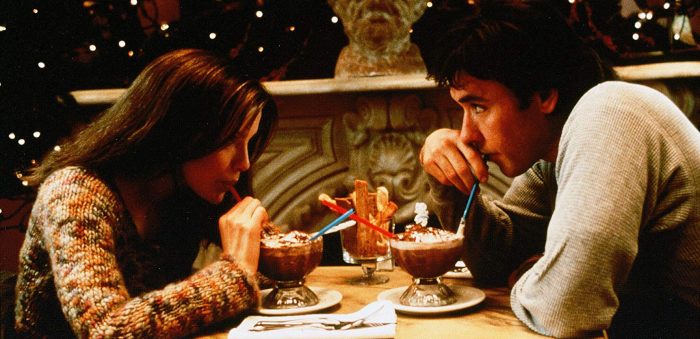
Jack, Rose & a Stork in the Night: Defining & Defying Romance
by Claudia Ware
“Sit. Feast on your life.”
Derek Walcott, ‘Love After Love’
“Friendship is certainly the finest balm for the pangs of disappointed love.”
Jane Austen, Northanger Abbey

Kate Beckinsale & John Cusack, Serendipity, 2001
"But it's not Serendipity", moans my housemate, referencing, not the experience of unplanned fortune, but the 2001 rom-com starring John Cusack and Kate Beckinsale. She's returned home from a date with a man she met on online and has already drafted the rejection text she'll send when the sun comes up. "Where's my rom-com? I want my rom-com!" she cries, in a self-aware spat. Her lips smile at the edges – we both know it's unlikely she'll get any such thing. Neither will I. Nor will my neighbours in the apartment below me, a young couple whose squabbles I hear with crystal clarity. It’s not love we won’t get, nor is it romance. It’s rom-com-romance – the sugary-sweet, fated love-story between charismatic [cis, white and straight] men and women in their late-twenties. Still, it's hard to shake yourself free from a narrative you’ve assumed was owed to you.
*
The stories we read, watch and listen to are, to some extent, inseparable from the stories we live. Personal imagination, that which exists solely in the cinema of our minds, cannot be wholly unyoked from the narrative-driven art-forms that ask us to perceive and imagine a life different to our own. These stories invite us to re-experience ourselves in myriad ways. For a time, we are him, we are her, we are them, we are there. And in the joy of it all, it's easy to surrender to narratives that are not your own. To, in some small way, after the book has been closed and the television turned off, attempt to harmonise with someone else's melody.
Like many young'uns, books and films played a central role in kindling my early imagination. With little data to hypothesise upon, narratives offered up a blueprint for what life might feel like in the future and for the 'me' I might be. I was slow to read, more out of stubbornness than intellect, but until I warmed to books, our family's VHS collection and occasional trips to the cinema kept the putty of my imagination warm and fecund.
In the year 2000, my taste in all things ‘narrative’ shifted. Under the furtive roof of my best friend’s house, we slotted a cassette titled Titanic into the VHS door. I was six, I was Rose, and what I saw was this: that life would not truly begin until I found my Jack. And so, the desire for a love story gathered form and quietly slipped its moorings into fibres of my imagination.
*
Rom-coms played a heavy-handed role in my tweens, teens and twenties. Before streaming on-demand became a staple of modern households, I relied on trips to our local Video Ezy to supply me with romantic fodder. Aside from Titanic, my top picks included [but were not limited to] Notting Hill, A Walk to Remember, My Best Friend’s Wedding, Moulin Rouge and 10 Things I Hate About You. For most of the heroines in these stories, the discovery of romantic love signified the end of individual discontent and the beginning of life ‘as it should be’. With lives as soft as tofu, a lover came along to calcify their hopes, dreams and desires. Many of the novels I read followed a similar track. As a tween, I was a sucker for Meg Cabot’s The Princess Diaries. In high school, I poured over Phillipa Gregory’s ‘historical’-romance novels and Jane Austen’s marriage plots. Girls at school passed around books like men’s magazines – Will we be like her one day? Rom-com-romance was the ultimate tapeworm—the more it ate, the stronger the story became.
*
Our desire for storytelling is what Italian philosopher Adriana Cavarero calls ‘the narratability of every person’ or the ‘narratable self’. In her book Relating Narratives (2000), she explores the concretising effect of storytelling on notions of selfhood. In one chapter, she retells the story of Ulysses who, when attending an event, hears the story of his life sung by a ‘blind rhapsod’. Ulysses weeps, suddenly able to understand the meaning of his life and answer the question, who am I? Identity is not inherent, argues Cavarero, rather, it’s something we come to comprehend via narratives that are supplied to us by others.
But what happens in the absence of a narrator? When no one is there to tell the story of our unique, unrepeatable existence? I wonder if, without the mouth of another to tell our story, we adopt characterisations and narrative arcs available to us; that the stories we read, watch and listen to, become inseparable from the stories we expect our life to yield.

‘Ulysses Weeps at the Song of Demodocus’ (1805) etching by John Flaxman (RA)
*
In recent years, my impression of romantic love has experienced a kind of death. Though, I do believe it’s a generative death – the corpse of a tree that continues to feed the understory long after its collapse. The love stories themselves aren’t worth telling in full, they all follow a similar set of adjectives - passionate, disappointing, regretful – or, as Durga Chew-Bose jibes in her essay, ‘Heart Museum’ – ‘consuming, though rarely nourishing.’
The question posed by Dr Rom-Com has always been: when will I get my love story? It’s a blinking cursor of a question, one that makes the heart distend. It also flattens the concept of romance into a one-size-fits-all structure.
What is ‘romance’? What makes something romantic?
I asked my loved ones:
An effort to make someone feel loved and desired, said Frankie.
Something that makes your heart flutter, said Helen.
Romance implies experiences of heightened emotion, elation, togetherness, said my brother.
Almond croissants and spooning, said Ben.
Romance is a really good apology, or laughing at the same thing, said Anna.
Something that feels energising, delightful and arresting, said Kate.
Romance is thoughtful, it’s carefully crafted, said Renae.
To know that you are seen and to feel that you are understood, said Jessie.
Romance? Overrated – love is the thing, said my father.
With each person I asked, I expected rom-com-romance to rear its head. But each of these definitions hung loose from the 'man-meets-woman' stories I've come to know. In fact, the language used around romance did not remind me of former boyfriends at all. Instead, it spoke directly to most, if not all, of my close female friendships.
Cavarero argues that female friendship contains strong narrative qualities, that they "consist [in a] reciprocal narrative exchange”, where "the questions 'who are you?' and 'who am I'…find their answer." Women serve as each other’s narrators, concerning themselves with the nature of a bios (a specific life) rather than a zoe (a general life).
Given their significance, why are stories of platonic love so underrepresented? It may have to do with structure. Rom-com-romance starts with a meet-cute, is threatened by a series of complications, and is [often] resolved in marriage. Stories of friendship resist this neat, three-act structure. Instead, they oscillate, have seasons, fail, and start again. They lack the emotional intensity of ‘romantic-love’ – high highs and low lows. They are mucky and mundane and complicated and real. This poses a serious challenge, not only for storytellers but for readers and viewers. If stories are patterns, and our brain rewards us for finding patterns, the knotty narrative threads of friendship are a square peg in the round hole of commercial success.
*
At times, I’m disappointed I haven't received my rom-com-romance. Not only for myself but my friends, too, who are regularly disappointed with their lot in love; the stories we grew up with made it all sing with inevitability. However, despite my status as a single woman, it's striking the amount of 'romance' my life seems to contain. Last Christmas, some of my friends wrote 'love letters' instead of giving gifts. On my birthday, a friend sent me a box of croissants, while another delivered freshly baked muffins to my door. We lend each other books and send poems on sad days. After break-ups, we sleep in each other's beds, getting each other through the toughest hours. Back in February, when I was down to my last pennies and drunk on heartbreak, my childhood best friend delivered me home-cooked meals in Tupperware containers. My friends know how I take my tea and recite my coffee order without missing a beat. They are loving, thoughtful and energising. They have gifted me more romance than any ‘love story’ I’ve experienced.
*
In her memoir Out of Africa, Karen Blixen shares the story of a man who, upon hearing a noise, goes out into the night. Running up and down in the darkness, he finally uncovers the source of the commotion, fixes it, and returns to bed. When morning comes, he looks out the window, discovering that his movements in the night have traced the image of a stork. The fable is a metaphor for storytelling, for its ability to look upon disparate events and create unity and meaning. But note – the man did not set out to trace a stork with his footsteps – the design was unforeseeable, it appeared in retrospect. Cavarero, too, urges against narrative control, suggesting that, “to plan one’s own life as though it were a story, to make it conform to an idea, to live it like a novel, is merely an error.”
*
I’d still like a Jack, someday – I’m not so jaded that I’ve burnt that desire at the stake. But I’m not Rose, and nor should I be. [I’m also unwilling to boycott rom-coms altogether, punishing them for the unhealthy expectations they have created for me; my fondness for their warmth, predictability and pop-soundtracks has a good shelf life yet.] In the meantime, there’s plenty of romance to feast on, plenty of forms it can take. My stork will appear in the future – that’s the magic of narrative. And what a waste it would be to keep my eyes on my feet – for someone to look out their window and see a strange woman, stumbling in the darkness, trying to draw a stork with her footsteps.




1 comment
Absolutely love this! brilliant, so insightful and is soo sooo true. How refreshing to read a piece that truly reflects reality – not the narrative that will always make us feel unworthy or faulty.
thank you Claudia.
Roslyn Russell
Leave a comment
This site is protected by hCaptcha and the hCaptcha Privacy Policy and Terms of Service apply.